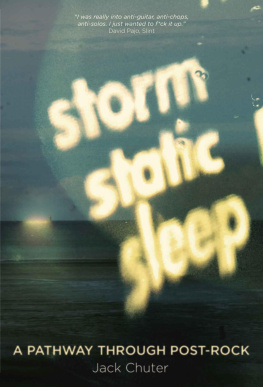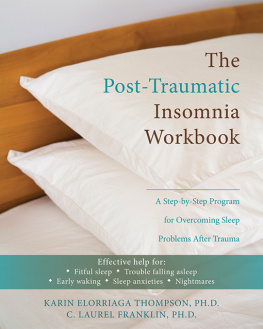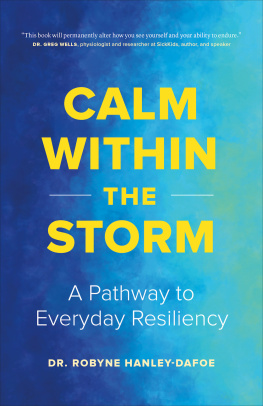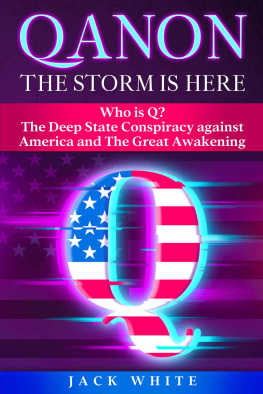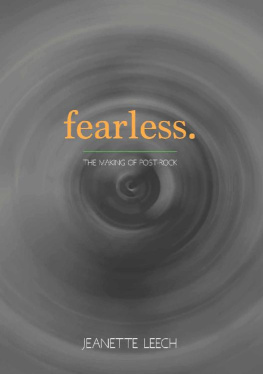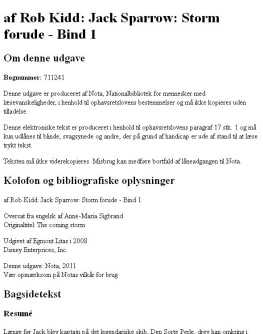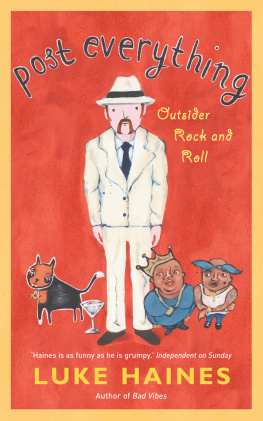Jack Chuter - Storm Static Sleep: A Pathway Through Post Rock
Here you can read online Jack Chuter - Storm Static Sleep: A Pathway Through Post Rock full text of the book (entire story) in english for free. Download pdf and epub, get meaning, cover and reviews about this ebook. year: 2015, publisher: Function Books, genre: Home and family. Description of the work, (preface) as well as reviews are available. Best literature library LitArk.com created for fans of good reading and offers a wide selection of genres:
Romance novel
Science fiction
Adventure
Detective
Science
History
Home and family
Prose
Art
Politics
Computer
Non-fiction
Religion
Business
Children
Humor
Choose a favorite category and find really read worthwhile books. Enjoy immersion in the world of imagination, feel the emotions of the characters or learn something new for yourself, make an fascinating discovery.
- Book:Storm Static Sleep: A Pathway Through Post Rock
- Author:
- Publisher:Function Books
- Genre:
- Year:2015
- Rating:4 / 5
- Favourites:Add to favourites
- Your mark:
- 80
- 1
- 2
- 3
- 4
- 5
Storm Static Sleep: A Pathway Through Post Rock: summary, description and annotation
We offer to read an annotation, description, summary or preface (depends on what the author of the book "Storm Static Sleep: A Pathway Through Post Rock" wrote himself). If you haven't found the necessary information about the book — write in the comments, we will try to find it.
Storm Static Sleep: A Pathway Through Post Rock — read online for free the complete book (whole text) full work
Below is the text of the book, divided by pages. System saving the place of the last page read, allows you to conveniently read the book "Storm Static Sleep: A Pathway Through Post Rock" online for free, without having to search again every time where you left off. Put a bookmark, and you can go to the page where you finished reading at any time.
Font size:
Interval:
Bookmark:
Storm Static Sleep
A Pathway Through Post-Rock
Jack Chuter
Function Books

Published by Function Books
#40, London, N22 6AD
www.functionbooks.com
Copyright Jack Chuter 2015
ISBN 978-0-9572492-2-6
The right of Jack Chuter to be identified as the author of this work has been asserted to him in accordance with the Copyright, Designs and Patents Act 1988.
All rights reserved. This book is sold subject to the condition that it shall not, by way of trade or otherwise, be lent, re-sold, hired out, circulated in any form or by any means, electronic, mechanical, photocopying, recording or otherwise without the publishers prior consent.
Designed by Steve Hutchins.
CONTENTS
Acknowledgements
Chapter 1 Introduction 1
Chapter 2 Talk Talk, .O.rang, Mark Hollis 6
Chapter 3 Slint, The For Carnation 25
Chapter 4 Rodan, Rachels, Gastr Del Sol 42
Chapter 5 Simon Reynolds 61
Chapter 6 Bark Psychosis, Disco Inferno, Main 74
Chapter 7 Labradford, Trans Am, Tortoise 105
Chapter 8 Mogwai 125
Chapter 9 Do Make Say Think, Constellation
Records, Godspeed You! Black Emperor 143
Chapter 10 Mono, Explosions in the Sky, Sigur Rs 176
Chapter 11 Neurosis, Isis, Post-Metal 210
Chapter 12 65daysofstatic, Tides From Nebula,
Maybeshewill 243
Chapter 13 ArcTanGent Festival, This Will Destroy
You, God Is An Astronaut 266
Bibliography
Acknowledgements
Thanks to my parents and step-parents for their invaluable and unconditional support. I know that the term post-rock still means so little to you, but you never fail to understand how much this project has meant to me. Thanks to my brother for being both a sounding board and a constant source of encouragement. Thanks to my friends for their support and occasional ridicule. Thanks to Shane and Vuk for sending this opportunity in my direction. All of my love to Lizzy and Fleetwood Cat, who will always be my primary sources of positive energy and inspiration.
Chapter 1
Introduction
After reading this book, I hope the term post-rock gets stuck in your throat the next time you use it, even if just for a moment. Think about the semantic cluster bomb youre about to detonate.
I expect that 90% of the readers of this book will use it to refer to the cinematic, predominantly instrumental rock music that hit a peak of popularity in the early 2000s. Mogwai, Sigur Rs, Godspeed You! Black Emperor. Bands whose explosive summits of distortion, cymbals and reverb are rendered exceptionally intense for emerging from such pronounced periods of quiet. Bands whose desire to rock out comes tempered by the humility and subservience of orchestral performance, offsetting progressive rocks domineering bombast with the sense that the performers are stranded, helpless, beneath the tidal wave of their own creation.
But some readers will have stumbled into post-rock at the turn of the 90s, ears still ringing from the explosion of post-punk. When English music journalist Simon Reynolds first spoke about post-rock as co-opting rock instrumentation for non-rock purposes, he was referring to bands like Tortoise, Pram, Trans Am, Bark Psychosis and Main. The common attribute of these bands was not musical. It wasnt really ideological either. Rather, it was one of circumstance an act of straddling the boundary between rock and the other, with one wayward foot sloshing in the waters of either techno, jazz, krautrock, dub reggae, electronica or musique concrte (or in the case of Tortoise, all of these combined). To examine this period of post-rock is to uncover the hub of rock innovation that was growing, almost in secret, underneath the trad rock revivalism of grunge and brit pop. While Soundgarden and Oasis lured the masses back toward the quintessential idea of the rock star, bands such as Labradford and Disco Inferno were quietly dismantling the rituals that governed how guitars, bass and drums could be utilised. This wasnt a music that revered rocks principles of machismo and muscle. Post-rock was about innovation and progression.
Post-rocks path of transformation, from early-90s proliferation to its post-millennial popularity peak, has been full of strange twists and splits. Not everyone was clear what Simon Reynolds meant when he referred to using rock instrumentation for non-rock purposes. As the term post rock was tentatively applied to new artists (often because they vaguely resembled an existing artist under the post-rock banner), the meaning started to mutate like a Chinese whisper. Old connotations fell away, others shuffled into their place. Its only very recently that the meaning of post-rock has begun to stabilise. But even now, its impossible to provide a succinct description of the term without falling into web of contradiction. How can post-rock be both the sprawling atmospheres of Godspeed... and the pocket-sized jams of Battles? If post-rock is so synonymous with instrumental music, why is it that the falsetto of Sigur Rs vocalist Jnsi is one of the most distinctive sounds in the post-rock universe?
Very few bands willingly identify with the term. Partly thats because of the above; post-rock still struggles to communicate and identify itself with conviction and clarity. But if were to take the term at face value for a moment, its also a strange and bold proclamation to make. Post -rock. Is this really the successor to rock music? A lot of post-rocks key players still see themselves as rock bands. When Explosions in the Sky sway and thrust into their sonic climaxes during live performances, theres a sense of visceral bodily exertion that comes straight from the heart of rock music. Yet even if post-rock was indeed the inevitable next chapter in the narrative of rock, wouldnt it be bizarre for a band to define themselves on the territory from whence they came, rather than where they find themselves currently? If its truly the point of departure from rock music, why retain the word rock within the term at all?
Despite this confusion, it is possible to carve a narrative through post-rock. This story doesnt follow the nurturing and expansion of a musical ethos; it follows the vessel of post-rock as it drifts, guided largely by speculation and guesswork, over the seas of sound. With each attempt to apply the term, new bands and connotations are brought into the fold. Often we see how post-rock has been used as a journalistic miscellaneous a placeholder for a more specific, directed description of music. Its because of this that post-rock has often acted like a flashlight pointing into the great unknown. Its an acknowledgement that our vocabulary of music is currently inadequate, leaving post as the only appropriate allusion to the presence of a mysterious other.
There is an inherent tension to the term post-rock. Its trying to escape itself, yet remains dependent on its former identity within rock. It suggests process: post-rock is an act of becoming a state of transience and mid-mutation where the remnants of the past still exist, malformed but recognisable, upon a surface that writhes in a state of flux. Thats why Im starting this book with two bands that underwent profound evolutions in sound and musical perspective. In both, we can see the presence of the other pushing up through the fabric of rock: non-rock instrumentation, a more profound dynamic range, a greater reliance on improvisation, a dramatic shift in the role of the human voice.
The two bands in question are Talk Talk from London, England and Slint from Louisville, USA. Both released their most significant records around the turn of the 90s. Both are frequently heralded as either the fathers of post-rock or the two most primary influences, and both employed very different approaches in twisting the framework within which they were founded. But most crucially, each foreshadowed the post-rock movement that would spark up in the UK and US in the wake of their demise. In 1993 Simon Reynolds coined the term post-rock in an interview with UK band Insides. Soon, he was picking out several other bands, across both the UK and the US, who he perceived to employ a post-rock approach. Many of these artists were expanding on the ideas that resided, albeit in a nascent form, within the music of Talk Talk and Slint.
Font size:
Interval:
Bookmark:
Similar books «Storm Static Sleep: A Pathway Through Post Rock»
Look at similar books to Storm Static Sleep: A Pathway Through Post Rock. We have selected literature similar in name and meaning in the hope of providing readers with more options to find new, interesting, not yet read works.
Discussion, reviews of the book Storm Static Sleep: A Pathway Through Post Rock and just readers' own opinions. Leave your comments, write what you think about the work, its meaning or the main characters. Specify what exactly you liked and what you didn't like, and why you think so.

